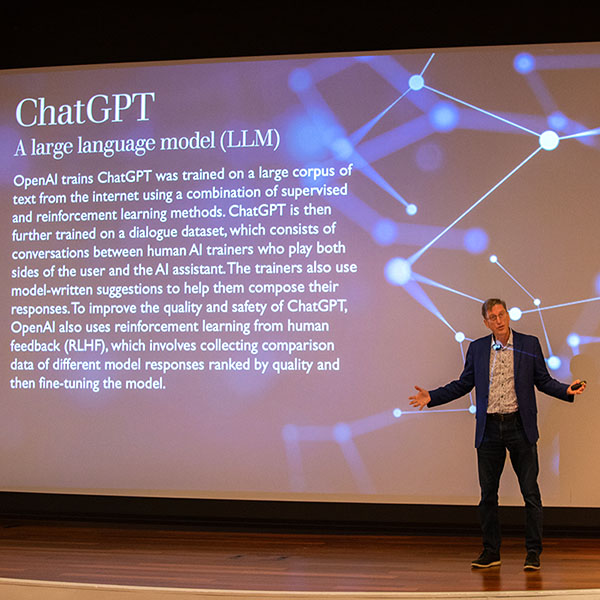Artificial intelligence (AI) has become a part of our daily lives, but how do we correctly use it in an academic setting? AI tools are increasingly used for research, writing assistance, and grading. While these offer immense benefits in terms of efficiency and productivity, they also come with their own set of challenges. You walk a fine line when using AI to engage in academic dishonesty. There are certain ways to use AI in the academic world, ensuring you understand the correct ways to leverage AI tools, and we are here to help you figure out how!
We connected with a few staff and faculty at Miami University Regionals who research AI and use it regularly to get their suggestions on the benefits and challenges for students using AI.
Use AI tools to boost your studying productivity
Start with your effort first
Like any resource, AI tools can be inaccurate, so use them alongside other resources to supplement your work.
- Be aware that human data contain biases and other fallacies that fuel AI tools.
- If you rely solely on AI tools for academic help, consider exploring your skills and abilities essential for success in college and in your future profession.

How can AI help me comprehend the content I’m learning in my classes?
- Use the AI tool(s) to ask questions about the topics you cover in class.
- Ask the tool to clarify, give examples, etc., if you’re uncertain that you understand the content.
- Assist with identifying topics you may not have considered. AI can help increase your understanding.
Can AI help me study more efficiently?
- Prompt the AI tool to suggest different study strategies—especially if you prefer certain methods (visual, recitation, etc.)
- Ask the AI tool to make study suggestions based on the topics you need to improve in remembering or understanding.
What cool settings and features does my AI tool have?
- Data Collection—Can you control what kind of data it can collect from you?
- Customization—Can you customize your tool based on your needs/field of study?
- Automation—Can you make daily tasks such as scheduling meetings or organizing emails faster and easier?
View/download a larger version of the Four Tips for Students Using AI infographic.
Avoid anthropomorphizing/humanizing AI
- It is important to remember that AI is not an expert in the way that a professor or someone working in a specific field is.
- Some people believe that all the content they see on TV, in movies, or their online search is fact or credible. However, AI tools are not vetted sources like encyclopedias or library archives.
- AI can make choices based solely on its coding and resources–not because it has feelings.
- Don’t assign human emotions or motivation to AI tools. It is better to view AI simply as a tool.
Thanks to Cara Spray, M.Ed., Miami University Regionals E-Campus Instructional Designer, for her AI research and contributions to the infographic and content.
More tips for college students using AI
Ethical Considerations with AI
- Talk to your instructor about their guidelines on using AI in the classroom.
- Engage in discussions about responsible AI developments.
- Discuss the ethical implications of AI usage, such as
- Privacy concerns
- Algorithmic bias (See this article from Harvard Business Review to learn more.)
- Impact on education.

Emphasize critical thinking
- Remember AI is a powerful tool.
- Approach its results critically.
- Question assumptions.
- Verify information from multiple sources, and consider the limitations of AI algorithms.

Continuous learning
- AI Technology is constantly evolving.
- Seek opportunities to enhance your AI skills.
- Search for AI-themed podcasts and blog articles, and attend networking events.
- Check out social media platforms for fun ideas on how to use AI as a student.
Collaboration and feedback
- Encourage yourself and others to collaborate with peers and seek feedback.
- Talk with classmates and learn how they are using AI.
- Practice using AI tools often. You will improve your skills!
Skill building
- Commit to a positive mindset with AI tools even if your results differ from what you seek.
- Edit and adjust your prompts to achieve your desired outcome.
- Develop your skills. AI can be your learning partner as you grow.
Thanks to Addrienne VanOver, Miami University Regionals E-Campus Instructor and Instructional Designer, for her AI research and contributions to this content.
Examples of how AI may improve the student experience
Tim Meyer, Miami University Adjunct Professor–Commerce; GE Aerospace–Executive Business Operations, shared some thoughts about how students and faculty may effectively use AI.
With any business, you always want the customer to have a great customer experience…The same holds for the student… AI may improve the “student experience” and further learning.
Tim meyer
Real-time and real-world information combined with text/course topics
With AI, you may experience the ability to stream real-time business and world event information directly into your course content. Streaming content while learning about it may help you better connect theory with “real-world” facts.
Accessibility for all students and student learning methods
We all learn differently. Accessibility accommodations require instructors to attempt to adjust materials, exams, and written assignments in a way that helps you gain the most from the class as efficiently as possible. AI can provide instructors with the ability to customize materials so that you can have an optimal learning experience.
AI is a powerful tool that needs to gain the trust of college students and faculty
AI is not new; manufacturing, engineering, and service industries have used AI for years. As AI becomes more broadly available, everyone needs to foster fundamental trust. It’s crucial to consider the real ramifications of using AI to complete assignments for grades rather than gaining knowledge independently. Faculty should also consider how AI impacts course development and degree programs.

When used the right way and effectively, AI can be helpful to college students
AI technologies in college settings offer many benefits for students. From personalized learning experiences to tailored academic support and enhanced research capabilities, AI empowers you to navigate your educational journey more efficiently and effectively. As we continue to embrace AI in education, it is essential to prioritize ethical considerations and adapt to evolving technology. AI can enhance your learning experience and prepare you for tomorrow’s workforce challenges.
Miami University Regionals E-Campus thanks and acknowledges Grace Osterberger for compiling and writing the content of this blog. Grace is a first-year student studying Applied Biology. She plans to further her career as a safety manager upon completing her degree.





